Shixuan Sun
DASH: Deterministic Attention Scheduling for High-throughput Reproducible LLM Training
Jan 29, 2026Abstract:Determinism is indispensable for reproducibility in large language model (LLM) training, yet it often exacts a steep performance cost. In widely used attention implementations such as FlashAttention-3, the deterministic backward pass can incur up to a 37.9% throughput reduction relative to its non-deterministic counterpart, primarily because gradient accumulation operations must be serialized to guarantee numerical consistency. This performance loss stems from suboptimal scheduling of compute and gradient-reduction phases, leading to significant hardware underutilization. To address this challenge, we formulate the backward pass of deterministic attention as a scheduling problem on a Directed Acyclic Graph (DAG) and derive schedules that minimize the critical path length. Building on this formulation, we present DASH (Deterministic Attention Scheduling for High-Throughput), which encapsulates two complementary scheduling strategies: (i) Descending Q-Tile Iteration, a reversed query-block traversal that shrinks pipeline stalls in causal attention, and (ii) Shift Scheduling, a theoretically optimal schedule within our DAG model that reduces pipeline stalls for both full and causal masks. Our empirical evaluations on NVIDIA H800 GPUs demonstrate that DASH narrows the performance gap of deterministic attention. The proposed strategies improve the throughput of the attention backward pass by up to 1.28$\times$ compared to the baseline, significantly advancing the efficiency of reproducible LLM training. Our code is open-sourced at https://github.com/SJTU-Liquid/deterministic-FA3.
ClusterFusion: Expanding Operator Fusion Scope for LLM Inference via Cluster-Level Collective Primitive
Aug 26, 2025

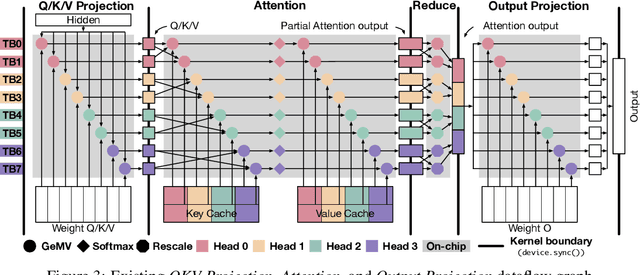

Abstract:Large language model (LLM) decoding suffers from high latency due to fragmented execution across operators and heavy reliance on off-chip memory for data exchange and reduction. This execution model limits opportunities for fusion and incurs significant memory traffic and kernel launch overhead. While modern architectures such as NVIDIA Hopper provide distributed shared memory and low-latency intra-cluster interconnects, they expose only low-level data movement instructions, lacking structured abstractions for collective on-chip communication. To bridge this software-hardware gap, we introduce two cluster-level communication primitives, ClusterReduce and ClusterGather, which abstract common communication patterns and enable structured, high-speed data exchange and reduction between thread blocks within a cluster, allowing intermediate results to be on-chip without involving off-chip memory. Building on these abstractions, we design ClusterFusion, an execution framework that schedules communication and computation jointly to expand operator fusion scope by composing decoding stages such as QKV Projection, Attention, and Output Projection into a single fused kernels. Evaluations on H100 GPUs show that ClusterFusion outperforms state-of-the-art inference frameworks by 1.61x on average in end-to-end latency across different models and configurations. The source code is available at https://github.com/xinhao-luo/ClusterFusion.
SMA: Who Said That? Auditing Membership Leakage in Semi-Black-box RAG Controlling
Aug 12, 2025Abstract:Retrieval-Augmented Generation (RAG) and its Multimodal Retrieval-Augmented Generation (MRAG) significantly improve the knowledge coverage and contextual understanding of Large Language Models (LLMs) by introducing external knowledge sources. However, retrieval and multimodal fusion obscure content provenance, rendering existing membership inference methods unable to reliably attribute generated outputs to pre-training, external retrieval, or user input, thus undermining privacy leakage accountability To address these challenges, we propose the first Source-aware Membership Audit (SMA) that enables fine-grained source attribution of generated content in a semi-black-box setting with retrieval control capabilities.To address the environmental constraints of semi-black-box auditing, we further design an attribution estimation mechanism based on zero-order optimization, which robustly approximates the true influence of input tokens on the output through large-scale perturbation sampling and ridge regression modeling. In addition, SMA introduces a cross-modal attribution technique that projects image inputs into textual descriptions via MLLMs, enabling token-level attribution in the text modality, which for the first time facilitates membership inference on image retrieval traces in MRAG systems. This work shifts the focus of membership inference from 'whether the data has been memorized' to 'where the content is sourced from', offering a novel perspective for auditing data provenance in complex generative systems.
Efficient Serving of LLM Applications with Probabilistic Demand Modeling
Jun 17, 2025Abstract:Applications based on Large Language Models (LLMs) contains a series of tasks to address real-world problems with boosted capability, which have dynamic demand volumes on diverse backends. Existing serving systems treat the resource demands of LLM applications as a blackbox, compromising end-to-end efficiency due to improper queuing order and backend warm up latency. We find that the resource demands of LLM applications can be modeled in a general and accurate manner with Probabilistic Demand Graph (PDGraph). We then propose Hermes, which leverages PDGraph for efficient serving of LLM applications. Confronting probabilistic demand description, Hermes applies the Gittins policy to determine the scheduling order that can minimize the average application completion time. It also uses the PDGraph model to help prewarm cold backends at proper moments. Experiments with diverse LLM applications confirm that Hermes can effectively improve the application serving efficiency, reducing the average completion time by over 70% and the P95 completion time by over 80%.
Pushing the Limits of Safety: A Technical Report on the ATLAS Challenge 2025
Jun 14, 2025Abstract:Multimodal Large Language Models (MLLMs) have enabled transformative advancements across diverse applications but remain susceptible to safety threats, especially jailbreak attacks that induce harmful outputs. To systematically evaluate and improve their safety, we organized the Adversarial Testing & Large-model Alignment Safety Grand Challenge (ATLAS) 2025}. This technical report presents findings from the competition, which involved 86 teams testing MLLM vulnerabilities via adversarial image-text attacks in two phases: white-box and black-box evaluations. The competition results highlight ongoing challenges in securing MLLMs and provide valuable guidance for developing stronger defense mechanisms. The challenge establishes new benchmarks for MLLM safety evaluation and lays groundwork for advancing safer multimodal AI systems. The code and data for this challenge are openly available at https://github.com/NY1024/ATLAS_Challenge_2025.
A Framework to Assess Multilingual Vulnerabilities of LLMs
Mar 17, 2025



Abstract:Large Language Models (LLMs) are acquiring a wider range of capabilities, including understanding and responding in multiple languages. While they undergo safety training to prevent them from answering illegal questions, imbalances in training data and human evaluation resources can make these models more susceptible to attacks in low-resource languages (LRL). This paper proposes a framework to automatically assess the multilingual vulnerabilities of commonly used LLMs. Using our framework, we evaluated six LLMs across eight languages representing varying levels of resource availability. We validated the assessments generated by our automated framework through human evaluation in two languages, demonstrating that the framework's results align with human judgments in most cases. Our findings reveal vulnerabilities in LRL; however, these may pose minimal risk as they often stem from the model's poor performance, resulting in incoherent responses.
vTensor: Flexible Virtual Tensor Management for Efficient LLM Serving
Jul 22, 2024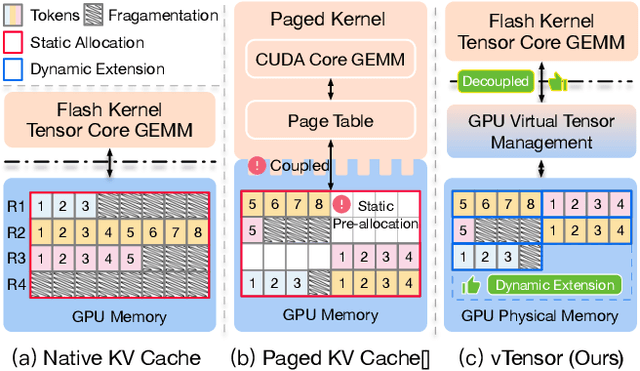
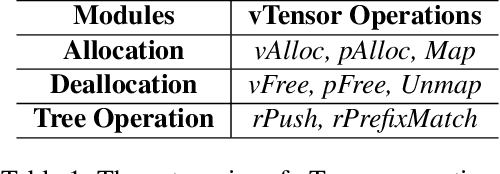
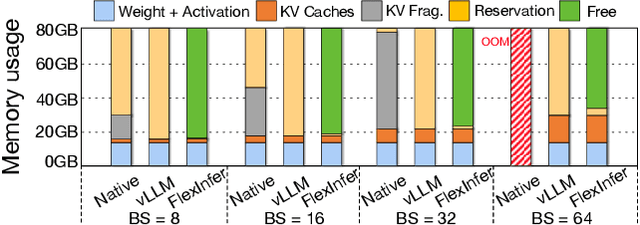
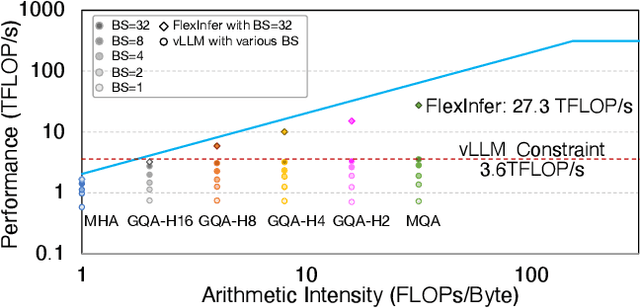
Abstract:Large Language Models (LLMs) are widely used across various domains, processing millions of daily requests. This surge in demand poses significant challenges in optimizing throughput and latency while keeping costs manageable. The Key-Value (KV) cache, a standard method for retaining previous computations, makes LLM inference highly bounded by memory. While batching strategies can enhance performance, they frequently lead to significant memory fragmentation. Even though cutting-edge systems like vLLM mitigate KV cache fragmentation using paged Attention mechanisms, they still suffer from inefficient memory and computational operations due to the tightly coupled page management and computation kernels. This study introduces the vTensor, an innovative tensor structure for LLM inference based on GPU virtual memory management (VMM). vTensor addresses existing limitations by decoupling computation from memory defragmentation and offering dynamic extensibility. Our framework employs a CPU-GPU heterogeneous approach, ensuring efficient, fragmentation-free memory management while accommodating various computation kernels across different LLM architectures. Experimental results indicate that vTensor achieves an average speedup of 1.86x across different models, with up to 2.42x in multi-turn chat scenarios. Additionally, vTensor provides average speedups of 2.12x and 3.15x in kernel evaluation, reaching up to 3.92x and 3.27x compared to SGLang Triton prefix-prefilling kernels and vLLM paged Attention kernel, respectively. Furthermore, it frees approximately 71.25% (57GB) of memory on the NVIDIA A100 GPU compared to vLLM, enabling more memory-intensive workloads.
CANDY: A Benchmark for Continuous Approximate Nearest Neighbor Search with Dynamic Data Ingestion
Jun 28, 2024
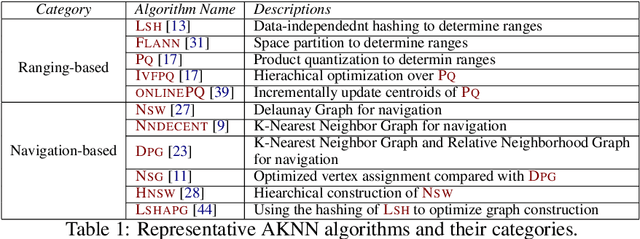
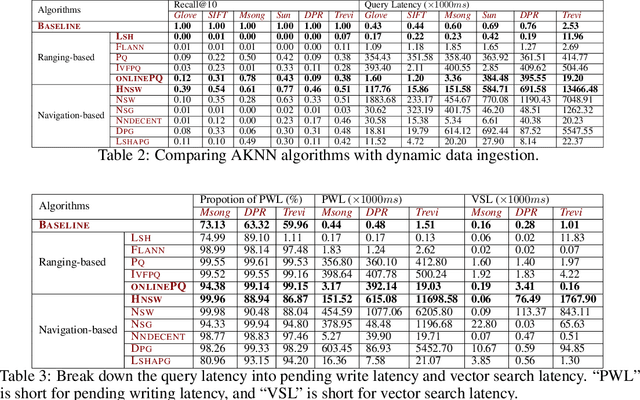

Abstract:Approximate K Nearest Neighbor (AKNN) algorithms play a pivotal role in various AI applications, including information retrieval, computer vision, and natural language processing. Although numerous AKNN algorithms and benchmarks have been developed recently to evaluate their effectiveness, the dynamic nature of real-world data presents significant challenges that existing benchmarks fail to address. Traditional benchmarks primarily assess retrieval effectiveness in static contexts and often overlook update efficiency, which is crucial for handling continuous data ingestion. This limitation results in an incomplete assessment of an AKNN algorithms ability to adapt to changing data patterns, thereby restricting insights into their performance in dynamic environments. To address these gaps, we introduce CANDY, a benchmark tailored for Continuous Approximate Nearest Neighbor Search with Dynamic Data Ingestion. CANDY comprehensively assesses a wide range of AKNN algorithms, integrating advanced optimizations such as machine learning-driven inference to supplant traditional heuristic scans, and improved distance computation methods to reduce computational overhead. Our extensive evaluations across diverse datasets demonstrate that simpler AKNN baselines often surpass more complex alternatives in terms of recall and latency. These findings challenge established beliefs about the necessity of algorithmic complexity for high performance. Furthermore, our results underscore existing challenges and illuminate future research opportunities. We have made the datasets and implementation methods available at: https://github.com/intellistream/candy.
Efficient Deep Learning Pipelines for Accurate Cost Estimations Over Large Scale Query Workload
Mar 23, 2021
Abstract:The use of deep learning models for forecasting the resource consumption patterns of SQL queries have recently been a popular area of study. With many companies using cloud platforms to power their data lakes for large scale analytic demands, these models form a critical part of the pipeline in managing cloud resource provisioning. While these models have demonstrated promising accuracy, training them over large scale industry workloads are expensive. Space inefficiencies of encoding techniques over large numbers of queries and excessive padding used to enforce shape consistency across diverse query plans implies 1) longer model training time and 2) the need for expensive, scaled up infrastructure to support batched training. In turn, we developed Prestroid, a tree convolution based data science pipeline that accurately predicts resource consumption patterns of query traces, but at a much lower cost. We evaluated our pipeline over 19K Presto OLAP queries from Grab, on a data lake of more than 20PB of data. Experimental results imply that our pipeline outperforms benchmarks on predictive accuracy, contributing to more precise resource prediction for large-scale workloads, yet also reduces per-batch memory footprint by 13.5x and per-epoch training time by 3.45x. We demonstrate direct cost savings of up to 13.2x for large batched model training over Microsoft Azure VMs.
 Add to Chrome
Add to Chrome Add to Firefox
Add to Firefox Add to Edge
Add to Edge